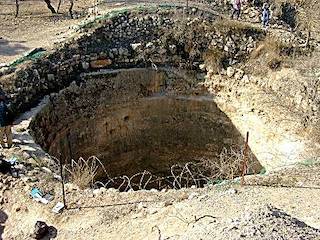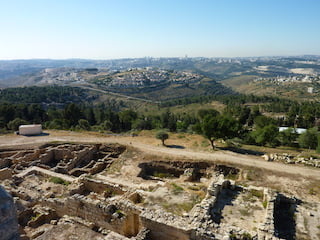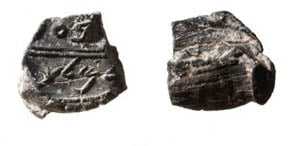 That was a good war plan, Alexander the Great, Hannibal, Napoleon, or any of them ain’t got nothing on You.
That was a good war plan, Alexander the Great, Hannibal, Napoleon, or any of them ain’t got nothing on You.

In 1956 a remarkable discovery was made that provides additional evidence of the authenticity of the biblical accounts of David’s days.
Before David had secured leadership over all the tribes of Israel.
Abner, who had been Saul’s general, served one of Saul’s sons.
Abner brought his army to fight David’s army, led by Joab.
Abner’s and Joab’s troops met beside the above famous water supply of that day called the pool of Gibeon.
“And Joab the son of Zeruiah, and the servants of David, went out and met them by the pool of Gibeon.
So they sat down, one on one side of the pool and the other on the other side of the pool.
Then Abner said to Joab, ‘Let the young men now arise and compete before us.’ And Joab said, ‘Let them arise.’ So they arose and went over by number, twelve from Benjamin, followers of Ishbosheth the son of Saul, and twelve from the servants of David. And each one grasped his opponent by the head and thrust his sword in his opponent’s side; so they fell down together.
Therefore that place was called the Field of Sharp Swords, which is in Gibeon.
So there was a very fierce battle that day, and Abner and the men of Israel were beaten before the servants of David” (2 Sam 2:13-17).
James Pritchard conducted an exploration of this site from 1956 to 1962.
He discovered 31 jar handles bearing the Hebrew name Gibeon, which confirmed the site.
Early in his search archaeologist Pritchard located a round water shaft, 37 feet in diameter, that led to a pool used by the city.
This shaft, comments Biblical Archaeology Review, “was cut into the limestone bedrock to a depth of over 82 feet.
Also cut into the limestone are a staircase and railing, which wind down to a level floor about halfway to the bottom of the shaft.
From there, the stairs drop straight down another 45 feet-to the level of the water table”.
In the same issue archaeologist Bryant Wood concludes:
“A large pool at Gibeon is no doubt the pool where the forces of Israel’s second king, David, fought under Joab against the forces of Saul’s son Ishbosheth under Abner.”
All the kings, the Hittite, Amorite, Canaanite, Perizzite, and the Jebusite, gathered together to fight Joshua. But the Gibeons were smart, they knew that You were with Joshua and they couldn’t beat You:
“And when the inhabitants of Gibeon heard what Joshua had done unto Jericho and to Ai.
They did work wilily, and went and made as if they had been ambassadors, and took old sacks upon their asses, and wine bottles, old, and rent, and bound up;
And old shoes and clouted upon their feet, and old garments upon them; and all the bread of their provision was dry and moldy.
And they went to Joshua unto the camp at Gilgal, and said unto him, and to the men of Israel, We be come from a far country: now therefore make ye a league with us.
And the men of Israel said unto the Hivites, Peradventure ye dwell among us; and how shall we make a league with you?
And they said unto Joshua, We are thy servants. And Joshua said unto them, Who are ye? And from whence come ye?
And they said unto him, From a very far country thy servants are come because of the name of the LORD thy God: for we have heard the fame of him, and all that he did in Egypt,
And all that he did to the two kings of the Amorites, that were beyond Jordan, to Sihon king of Heshbon, and to Og king of Bashan, which was at Ashtaroth.
Wherefore our elders and all the inhabitants of our country spake to us, saying, Take victuals with you for the journey, and go to meet them, and say unto them, We are your servants: therefore now make ye a league with us.
This our bread we took hot for our provision out of our houses on the day we came forth to go unto you; but now, behold, it is dry, and it is moldy.
And these bottles of wine, which we filled, were new; and, behold, they be rent: and these our garments and our shoes are become old by reason of the very long journey.
And the men took of their victuals, and asked not counsel at the mouth of the LORD.
And Joshua made peace with them, and made a league with them, to let them live: and the princes of the congregation swear unto them.
And it came to pass at the end of three days after they had made a league with them, that they heard that they were their neighbors, and that they dwelt among them.
And the children of Israel journeyed, and came unto their cities on the third day. Now their cities were Gibeon, and Chephirah, and Beeroth, and Kirjath-jearim.
And the children of Israel smote them not, because the princes of the congregation had sworn unto them by the LORD God of Israel. And all the congregation murmured against the princes “(Josh 9:3-18).
Because they had promised not to kill them they couldn’t, so they turned them into slaves. Tricked and lied to didn’t matter, Joshua made a promise and God does not like liars.
Later, Adoni-zedek, the king of Jerusalem, heard what Joshua had utterly destroyed Ai and Jericho and he too was scared.

One looks down from the mountain on Ramot and Jerusalem to the south-east.
At the time of the Israelite’s entry into Canaan, Gibeon was the chief city of the Hivite confederacy.
Other cities of their’s were Chephirah, Beeroth and Kiriath-Jearim.
In 2 Sam 21:2, however, the Gibeonites are called Amorites.
It appears that the name Amorite was used as a general term for all non-Israelis remaining in the land, especially in later writings.
Gibeon was made a Levitical city.
It was founded in this location because of its excellent water supply of 8 springs, and an underground reservoir. It is only 5 miles, from Jerusalem and is 2,533 ft above sea level.
Apart from the excellent view over Jerusalem, one can see on a clear day from One of the springs on the Samuels Mt – on the Auerbach property
this high place, to the Mediterranean in the west and the Mountains of Moab in the east.
The men of Gibeon went to Joshua because the kings of the Amorites were coming to destroy them, so he took it to God.
“And the LORD said unto Joshua, Fear them not: for I have delivered them into thine hand; there shall not a man of them stand before thee” (Josh 10:8).
And the Israelites slaughtered most of them. The ones that got away managed to get as far as Beth-horon. God then threw down great stones from heaven and they all died; more died from the hailstones than from the children of Israel’s sword.
“Then spake Joshua to the LORD in the day when the LORD delivered up the Amorites before the children of Israel, and he said in the sight of Israel, Sun, stand thou still upon Gibeon; and thou, Moon, in the valley of Ajalon.
And the sun stood still, and the moon stayed, until the people had avenged themselves upon their enemies. Is not this written in the book of Jasher? So the sun stood still in the midst of heaven, and hasted not to go down about a whole day.
And there was no day like that before it or after it, that the LORD hearkened unto the voice of a man: for the LORD fought for Israel” (Josh 10:12-14).
Joshua returned to Gilgal and the five kings mentioned above hid in a cave at Makkedah. Joshua then had his men roll big stone upon the mouth of the cave.
They then went and killed all the kings’ men. After the slaughter they returned and Joshua called his men to the cave.
“And it came to pass, when they brought out those kings unto Joshua, that Joshua called for all the men of Israel, and said unto the captains of the men of war which went with him, Come near, put your feet upon the necks of these kings. And they came near, and put their feet upon the necks of them.
And Joshua said unto them, Fear not, nor be dismayed, be strong and of good courage: for thus shall the LORD do to all your enemies against whom ye fight.
And afterward Joshua smote them, and slew them, and hanged them on five trees: and they were hanging upon the trees until the evening” (Josh 10:24-26).
Joshua next fought against Libnah, then he went and defeated Lachish, as well as Horam king of Geser that came to help Lachish. They then took Eglon, Hebron, and Dibir.
Because God fought for him he utterly destroyed every kingdom from Kadesh-barnea to Gaza and all the country of Goshen, even unto Gibeon, and then returned to Gilgal.
Many people say that since God is a loving God He won’t put anyone in Hell, these people obviously have not read the Bible.
The are correct that He is a loving God, but He doesn’t love evil and He will destroy it, as well as anything or anyone involved with it.
Gibeon

Discovered during the Temple Mount Sifting Project, this seventh-century B.C.E. clay bulla inscribed in paleo-Hebrew script with the phrase “Gibeon, for the king” provides new evidence for how ancient taxes were collected during the reign of the Biblical King Manasseh.
Benjamin Franklin and Mark Twain both famously remarked about the certainty of death and taxes, and a recent archaeological discovery concerning ancient taxes in Jerusalem has added to scholars’ certainty about a tax system in ancient Israel, especially during the reign of Judah’s King Manasseh.
Assyrian records suggest that King Manasseh implemented heavy taxes on his people in order to pay tribute to King Esarhaddon and then King Ashurbanipal, Sennacherib’s successors in Assyria.
These ancient taxes thus helped King Manasseh maintain relative peace in Judah during his 55-year reign.
Other evidence from the paleo-Hebrew inscribed fiscal bullae indicates that the city of Lachish was rebuilt during this time, 16 years after its destruction by Sennacherib’s invading army.
Gibeon is located at the modern village of el-Jib, 6 miles (9.6 km) northwest of Jerusalem.

At the time of Joshua, it had a large wall around the crown of the hill and also a secure water supply so could have been well defended.
You have to wonder why the Gibeonites were so afraid of the Israelites when they lived in such a secure city.
They indeed knew that God was with them and knew they needed to do something to save themselves.
The story of Joshua is a story to remember.
When things get tough or out of hand and you are ready to throw in the towel, think of Joshua and turn to God.
Pottery and two Egyptian scarabs (stone beetles used as talismans, ornaments or symbols of resurrection) indicate occupation at the time of the conquest, but no architecture from that period has yet been unearthed.
Only a small fraction of the site has been excavated, however, so there is much more to investigate.
Gibeon was “an important city, like one of the royal cities”. It ruled a small league of cities that included Kephi-rah, Beeroth and Kiriath Jearim.
When the Gibeonites arrived at Gilgal, 16 miles (nearly 26 km) to the east, they deceived the Israelites by noting the condition of their wineskins:
These wineskins that we filled were new, but see how cracked they are (Josh 9:13).
In the divided monarchy period wine-making was a major industry in Gibeon.
The people used both wineskins and jars as containers for wine.
The handles of the jars in which the wine was exported were inscribed with the name of the city, along with that of the vintner.
Some 31 jar handles have been discovered here inscribed with the name “Gibeon,” making identification of the site a certainty — a welcome rarity in the archaeology of Palestine.
When Joshua discovered the Gibeonites’ deception, he consigned them to servitude as “woodcutters and water carriers for the house of my God”.
The most conspicuous feature of Gibeon is in fact its abundant water supply: one major and seven minor springs.
The “pool of Gibeon” is mentioned in 2 Sam 2:13 and the “great pool in Gibeon” in Jer 41:12.
Visits: 0
